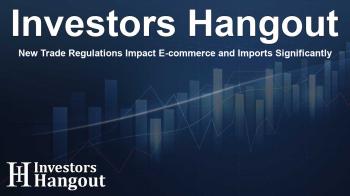New Trade Regulations Impact E-commerce and Imports Significantly

New Trade Rules Announced
The Biden administration has recently taken significant steps to announce new rules that will modify the way low-value shipments are handled under the $800 "de minimis" threshold. This action is expected to have substantial implications for the e-commerce sector.
Impact on E-commerce Firms
This regulatory change primarily affects companies such as Shein and PDD Holdings' Temu, which have been widely using the de minimis exemption to import a large volume of low-cost items to U.S. customers. These businesses have been shipping millions of small packages daily, which have now come under scrutiny.
Reason behind the Change
The U.S. government has indicated that these measures are aimed at closing a trade loophole that reportedly has been exploited for nefarious activities, including the shipment of fentanyl precursor chemicals that bypass customs inspections.
Customs and Border Protection Involvement
U.S. Customs and Border Protection (CBP) agency is spearheading the implementation of these proposed rules. The regulations will deny duty-free exemptions for low-value packages that contain goods subject to Section 301 tariffs related to imports from China. This includes numerous apparel items that will now be subject to applicable duties.
Additional Tariffs Affected
Moreover, these new rules extend beyond goods from China. Packages that contain products subject to Section 232 tariffs on steel and aluminum, as well as Section 201 duties on solar imports, will also see similar restrictions. This broadens the scope of the rule to a range of items that previously benefited from the low-value shipment exemption.
Requirements for Small Package Shippers
In addition to the tariff reclassifications, small package shippers will now be mandated to provide 10-digit Harmonized Tariff Schedule classifications for the contents of their packages to claim any exemption successfully. This requirement will allow customs officials to better monitor the import of goods and identify any illicit materials more effectively.
Government Stance
National Economic Advisor Lael Brainard has expressed the government’s position on these changes, stating that the administration cannot allow foreign e-commerce platforms to gain an unfair trade advantage over domestic businesses. The new rules are viewed as a necessary step to level the playing field for American workers and ensure compliance with U.S. laws, which aim to safeguard public health and safety.
Conclusion
In summary, the Biden administration's new proposed rules illustrate a substantial shift in the regulation of low-value shipments. As e-commerce continues to grow, the government is taking measures to ensure fair practices and enhance public safety by closing loopholes that have previously allowed violations. Businesses operating in this space need to stay vigilant and adapt quickly to the new rules to maintain compliance and competitiveness in the market.
Frequently Asked Questions
What are the new trade rules introduced by the Biden administration?
The Biden administration has proposed new regulations to restrict duty-free imports under the $800 de minimis threshold, particularly for goods subject to certain tariffs.
How will these changes affect e-commerce companies?
The new rules will significantly impact e-commerce businesses, especially those relying on low-value shipments, as they will now face tariffs on various imported goods.
What is the purpose of these new measures?
The measures aim to close loopholes exploited by some companies for unfair trade advantages and to ensure compliance with U.S. customs regulations.
What are Harmonized Tariff Schedule classifications?
These classifications are a standardized numerical method of classifying traded products, which will now be required for claiming duty-free exemptions.
Why is the government concerned about low-value shipments?
The government is concerned that low-value shipments have been exploited to avoid inspection and regulations, facilitating the entry of illegal goods into the U.S.
About Investors Hangout
Investors Hangout is a leading online stock forum for financial discussion and learning, offering a wide range of free tools and resources. It draws in traders of all levels, who exchange market knowledge, investigate trading tactics, and keep an eye on industry developments in real time. Featuring financial articles, stock message boards, quotes, charts, company profiles, and live news updates. Through cooperative learning and a wealth of informational resources, it helps users from novices creating their first portfolios to experts honing their techniques. Join Investors Hangout today: https://investorshangout.com/
Disclaimer: The content of this article is solely for general informational purposes only; it does not represent legal, financial, or investment advice. Investors Hangout does not offer financial advice; the author is not a licensed financial advisor. Consult a qualified advisor before making any financial or investment decisions based on this article. The author's interpretation of publicly available data presented here; as a result, they should not be taken as advice to purchase, sell, or hold any securities mentioned or any other investments. If any of the material offered here is inaccurate, please contact us for corrections.
